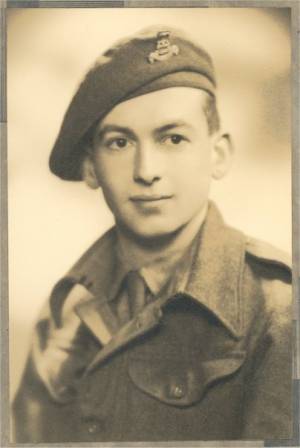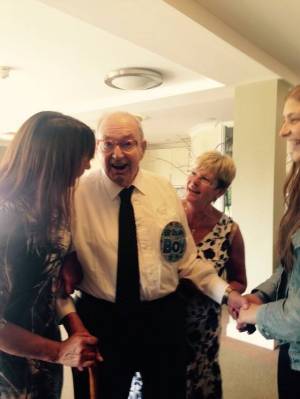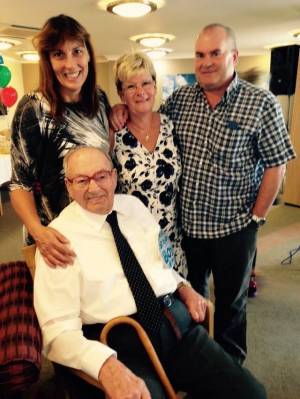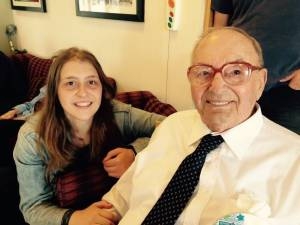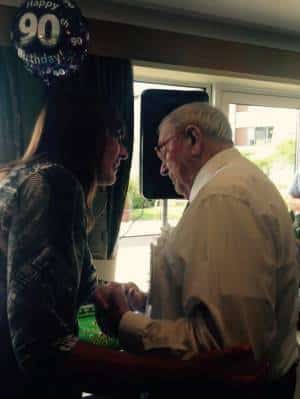Hand hold – Dancing with Dementia
A note from Jacqui
Hand hold – My Dad, John Offen, has Alzheimer’s and Vascular Dementia.
He was born in 1925, the son of a farmer, in a time when cars were a luxury and televisions didn’t exist. On the farm where Dad grew up there was a horse called Prince, that worked the land and of course, much of the labour was manual. Dad cycled miles to school and recently told me that he was selected to play football for the school and once had forgotten his boots, which meant bicycling from Sutton Valence all the way back to the farm, close to Headcorn to collect his boots and return again. Something which today’s youth probably would never consider.
Mum died in 1991, leaving Dad alone, but solid and independent. The first signs of Dad’s dementia came many years before the official diagnosis around 2012 and in discussions with family we can whole heartedly say that his journey along the dementia road started as many as seven or eight years before the family even realised, but now with hindsight we can tell a different story, with his vivid tall tales and strange stories which could ‘almost be reality’ – like imagining Dad’s long time widowed friend was having a secret affair in the neighbouring woodland every other day with her lover.
As the years progressed so did our Father’s eccentricity, but, so much was ‘normal’ it was always forgiven, the line between reality and fiction so very blurred. Dad moved up country to live near my sister who, in his words ‘could help him put his socks on’.
After moving up there, my Sister would regularly find him confused about the time of day, thinking 7pm was 7am. Or find him in bed asleep in the afternoon, as he thought it was bed time. Too many stories of odd behaviour.
After two years, my Sister’s retirement to a new home touring the Canals of England meant our Father could not be left alone in his bungalow. He still managed to drive occasionally (then aged about 84), but without daily supervision he would have been left precariously managing himself.
So it came that Dad and I moved to Hawkinge together, my teenage daughter, our dogs and cat, plus my Dad’s cat made a busy bungalow.
It was immediately noticeable that Dad struggled to remember things, was confused over times and people. The move had disrupted his equilibrium significantly.
I would return from work to find six packets of cheese, six packets of bacon and six packs of butter on a regular basis – of course, Tesco had a BOGOF on these items and he would visit two, (or three) times a day and forget what he had gone for, or forget he had already bought the items.
One occasion my nephew spotted his Grandad wandering the village streets on a Sunday morning carrying a book. He phoned my Brother, who was despatched to pick Dad up. Dad told him he was trying to return his Library book. Of course, the book was not borrowed from a library at all, there was no library in the Village either.
One day he told me he had a lovely day as he had been to Canterbury on the bus. He then explained that he had been to Folkestone on the bus originally, tried to return to our village, but forgot where he lived and stayed on the bus all the way to Canterbury. Luckily the driver recognised him and as the bus was on a circular route, it turned round and headed back to Hawkinge and the driver let Dad off at the correct stop.
Returning home to find white hot cinders, of what were new potatoes in a saucepan, with the gas hob still alight, the house full of blue hazy smoke and Dad tucked up in bed, brought home the severity of his condition.
These common place incidents became more and more frequent, resulting in asking Age UK to help. A marvellous place, with great care for a large portion of the day. As his condition continued to decline slowly, I resorted to private carers and assistance from KCC. Learning to navigate the troubled waters of the benefit system for him.
I would regularly wake up in the middle of the night – the early hours, to find Dad dressed, even with hat and coat on and when questioned, he would tell me that he was waiting for the bus to take him to Age UK in Folkestone.
From rotting cat food found in the cupboard, the fridge or the microwave, to cake in his pockets or the half eaten toast saved for dinner to avoid waste there would be some tale to tell on an almost daily basis to bring a smile to a listener’s face.
My home was furnished with Internal cameras to check Dad was safe, alarms to make sure he didn’t leave the building without alerting me, or to wake me when he got out of bed. A key safe to allow others entrance if necessary. Not to mention the kind local shops keeping a key for him for the numerous occasions he locked himself out. With signs on every door and arrows pointing the way to different rooms – many a visitor laughed as they read ‘Don’t forget Teddy’ (his keyring).
Too many tales of things which are and were funny, when taken singularly and in context – but when you witness the decline of one you love and consider that there are so many elderly who do not have that level of care and help, the devastation which Alzheimer’s can wreak is massive.
Dad has now moved into a wonderful care home, which promotes assisted living for the residents. Keeping them safe and cared for, but affording them all the independence they can want, with their own rooms and facilities. With wonderful medical care and great staff, Dad is really very happy and settled. Although the path I trod to get him there was not so easy for me or my conscience, the result has been a settled and happy Dad.
Being able to spot the signs of Dementia in the elderly and react correctly is really important – understanding the help they need to keep them independent and active in the community is essential.
I am convinced Dad’s decline was arrested due to his interaction with others, Age UK and his great private carers who took time to get to know him and socialise with him, taking him out and stimulating his days.
Dad now has a lovely time, he has activities every week day which he can choose to join in, even enjoying singing in the choir and he also attends church regularly to sing, something I would never of thought. The home takes many of the residents to the local pub for lunch once a month, they have entertainers visit, they arrange external visits – a group went to France only last year for an adventurous day trip to La Coupole. Dad explains to me that he is lucky and happy – he says he has all he needs, something to eat, something to drink and Tom and Jerry on DVD (amongst others).
You can speak to Dad and he will tell you that he cant remember anything from earlier that day, or sometimes anything from his last 60 years, remembering only childhood memories. Often he keeps his lack of memory under wraps, being socially aware enough that he would not want to offend anyone and them realise he doesn’t know them when they ring or visit.
Holding Dad’s hand and telling him I love him is something I continue to do as often as I can. Perhaps not daily now as I have learned to trust his care to the home, but I continue to visit bi- or tri- daily. I hear him tell me he loves me, something that the Dad of twenty years ago would never have done.
I am lucky I can still spend time with him and that I can enjoy my visits, laughing with someone who is eminently funny, loving and without doubt one of the biggest hearted individuals I know.
Many who experience dementia in their parents are not so lucky. As I think of some of my friends, my business associates and business friends who have told me their tales, I appreciate that this disease touches us all – sometimes with devastating effect. Watching the parent, or senior who once was a formidable force in your life slip away mentally is quite a draining experience. When you realise that the person who knew you once, so well, does not only not remember you, but has forgotten his wife, or forgotten his family, it can be heart wrenching. Eventually losing them completely.
I hold on to the fact that no matter what, even if Dad forgets I visit, because he does, feeling that my visit creates, stays with him. If I leave him laughing and happy, that feeling remains, long after I leave and long after he forgets I was there.
So, from this personal diatribe I decided I should do something. I’m not one for parachute jumps, night walks or sponsored cycle rides, but I do like to dress up from time to time. My Dad was the first man I remember dancing with. I stood on his shiny shoes at a ‘black tie’ event as a child and he whisked me around in a Fox Trot.
So for my Dad – a happy and settled 90 year old, soon to be 91. Who lives in a black hole of dementia I wanted to do a little something to raise funds for the organisation that supports people, both the person affected and the families dealing with the ripples of Dementia and Alzheimer’s.
Hence a Gala Dance – in aid of the Alzheimer’s Society in one of the most attractive settings I could think of in the area.
Jacqui


